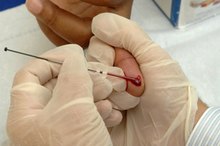What Is High RDW and Low Ferritin?
A red blood count test primarily helps your doctor detect anemia, or low red blood cells. RDW and ferritin are part of this test. RDW refers to red cell distribution width. It measures how much your red blood cells vary in size. Ferritin is a protein that stores iron. Ferritin values allow your doctor to determine how much iron is stored in your body.
High RDW
Red blood cells transport oxygen from your lungs to your organs and tissues. They also carry carbon dioxide to your lungs, which you release when you exhale. Your RDW result is high if your red blood cells vary greatly in size. The normal reference range varies depending on the laboratory, but 11.5 to 14.5 is considered normal, according to Lab Care Plus Patient Services.
High RDW Causes
What Is MCHC in a Blood Test?
Learn More
High RDW can have more than one cause. Your doctor will examine other red blood values to help determine the cause in your situation. When your red blood cells are low, your body releases large red blood cells called megaloblasts in an effort to bring your count back to normal. However, these blood cells have not matured and do not function properly. Vitamin B-12, or folate, deficiency can cause high RDW. It can also happen if your red blood cells have a life cycle shorter than the normal 120 days.
Low Ferritin
According to Medline Plus, the normal ferritin range is 12 to 300 ng/mL for males and 12 to 150 ng/mL for females. A low ferritin value means your body is storing less than normal iron. Because iron helps transport oxygen, this determines your body's oxygen transport capabilities. Dietary iron deficiency and absorption problems can cause low ferritin levels. As a result, you may feel tired, easily fatigued, light-headed, or experience shortness of breath.
High RDW and Low Ferritin Treatment
Reasons for a Low Red Blood Count of 7.7
Learn More
Treatment depends on the cause. If deficiency is causing your high RDW and low ferritin, your doctor may recommend supplements and dietary changes to bring your levels within the normal range. For instance, B-12 is abundant in animal products, and folate is found in green vegetables, peanuts and beef liver, to name a few. Iron-rich foods include beef, chicken, cod, oysters and tuna. Discuss your test results with your doctor so he can recommend the best treatment option for you. Only take supplements under your doctor's supervision.
Related Articles
References
Writer Bio
Janet Renee is a clinical dietitian with a special interest in weight management, sports dietetics, medical nutrition therapy and diet trends. She earned her Master of Science in nutrition from the University of Chicago and has contributed to health and wellness magazines, including Prevention, Self, Shape and Cooking Light.









